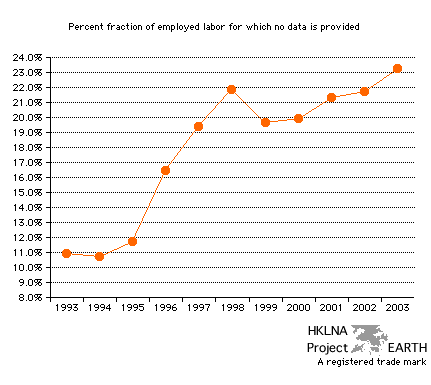Hong Kong's Information Society
The structure, flow, use, and language of information in Hong Kong society
Hong Kong's Information Technology and Telecommunications Industries
| Graph 109 - Hong Kong's missing
workers. graphs 101a, 101b, and 101c | graphs 108a, 108b and 108c | graphs 114a and 114b | data collection (graphs) |
 |
| Note 1: Reading the notes that accompany these two data sets is a valuable exercise in Hong Kong data collection and (mis)representation. For example, under the category labelled construction one learns that only those who engage in manual labor have been included. Taxi drivers, bus drivers, and a whole host of other actively engaged people vital to the running of the transportation industry are missing from the category transportation. Similar gaps can be found under the heading for civil servants. In fact, comparing the number of people employed in Hong Kong's labor force (total labor force less unemployed and underemployed workers) for the years 1993 to 2003 (source three below) with the number of people employed in government and various industries (sources two and one below, respectively) yields discrepancies of between 10.7% (1994) and 23.2% (2003). With so much data missing more detailed analysis hardly seems worthwhile. |
| Note 2: One way for a government to control information while giving the appearance of a free and open society is to provide partial information that is easy to obtain, while making it more difficult to obtain full information. Hong Kong law makes it appear that all information is easily accessible, if certain conditions are met. By making those conditions difficult to meet; however, only those people's research that the government favors is ever likely to be conducted. Results of research conducted based on partial information can always be challenged by those with full information, because results based on partial information are never complete. With regard to the data provided above this condition is apparently becoming worse over time. |
| Source 1: Hong Kong Government. Census and Statistics Department. Hong Kong statistics. Frequently asked statistics. Labour and employment. Number of establishments, persons engaged and vacancies (other than those in the civil service) analysed by industry sector [online document] (18 June 2004). EARTH's copy of corresponding table available on request. |
| Source 2: Hong Kong Government. Census and Statistics Department. Hong Kong Statistics. Frequently Asked Statistics. Labour and employment. Number of civil servants and civil service vacancies [online document] (18 June 2004). EARTH's copy of corresponding table available on request. |
| Source 3: Hong Kong
Government. Census & Statistics Department. Hong Kong statistics.
Frequently asked statistics. Labour and employment. Statistics on
labour force, unemployment and underemployment [online
document] (18 June 2004). EARTH's copy of
corresponding table available
on request. |
| top |